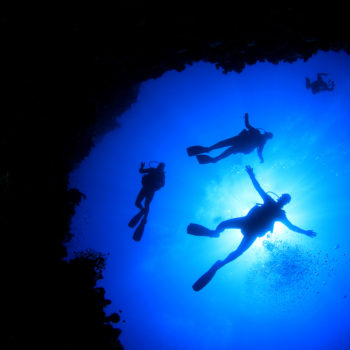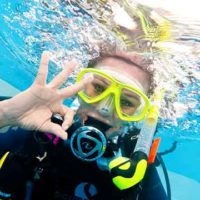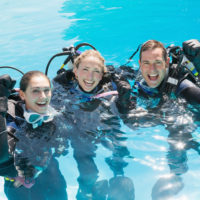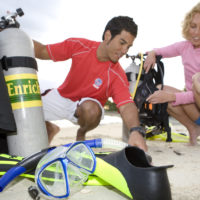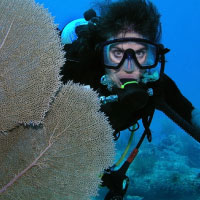Have you ever wondered what it’s like to breathe underwater? If you want to try scuba diving, but aren’t quite ready to take the plunge into a certification course, Discover Scuba Diving is for you. Kura Kura Divers offer this program in a Shanghai Dive Club pool. While not a scuba certification course, Discover Scuba Diving is a quick and easy introduction to what it takes to explore the underwater world.
Discover Scuba Diving introduces diving in a relaxed way. You will learn some basic dive skills and experience fun and excitement of diving in the pool session under the supervision of Kura Kura Divers’ PADI Instructor. Enjoy the unlimited excitement and fun that diving brings to you.
Who should take this course?
To sign up for a PADI Discover Scuba Diving experience, you must be at least 10 years old. No prior experience with scuba diving is necessary, but you need to be in reasonable physical health. Complete the signup paperwork on arrival, parents will have to sign for anyone younger than 18. Parents also must be present poolside throughout the entire duration of the session.
What will you learn?
You learn the basic safety guidelines and skills needed to dive under the direct supervision of Kura Kura Divers’ PADI Professional. Get ready to:
-
Learn About the scuba equipment you use to dive and how easy it is to move around underwater with your gear.
-
Find out what it’s like to breathe underwater.
-
Learn key skills that you’ll use during every scuba dive.
-
Have fun swimming around and exploring.
What gear will you use?
You’ll use basic scuba gear including a mask, snorkel, fins, regulator, BCD and a scuba tank.
Bring your own swimsuit, towel and footwear.
Course Schedule
-
Saturday mornings – 2 hours (7:30-9:30AM)
If you’ve always wanted to take scuba diving lessons, experience unparalleled adventure and the world beneath the waves, this is where it starts. Get your scuba diving certification with the PADI Open Water Diver course – the world’s most popular and widely recognized scuba course. Millions of people have learned to scuba dive and gone on to discover the wonders of the aquatic world through this course.
Who should take this course?
To enroll in a PADI Open Water Diver course (or Junior Open Water Diver course – ages 10-14), you must be 10 years old or older. You need adequate swimming skills and need to be in good physical health. No prior experience with scuba diving is required.
What will you learn?
The PADI Open Water Diver course consists of three main phases:
-
Knowledge Development (independent study and classroom) to understand basic principles of scuba diving
-
Confined Water Dives to learn basic scuba skills
-
Open Water Dives to use and refine your skills
What scuba gear will you use?
In the PADI Open Water Diver course, you learn to use basic scuba gear, including a mask, snorkel, fins, regulator, buoyancy control device and a tank. The equipment you wear varies, depending upon whether you’re diving in tropical, temperate or cold water.
Course Schedule
-
Self Study at home
-
Knowledge Development (about 10 hours)
-
Confined Water (5 dives – about 10 hours)
-
Open Water Dives (4 dives)
The knowledge development and confined water sessions are held in JinQiao. The open water dives are completed over 2 days – can be done in Qiandao Lake or on your holiday via referral.
Course Options:
-
Full Course Package – Knowledge Development, Confined Water and Open Water Dives at Qiandao Lake (May-November only)
-
Referral Package – Knowledge Development and Confined Water. You complete the open water dives on your holiday at any PADI dive center.
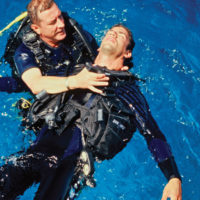
Full Course:
EFR + Rescue: RMB7050
Rescue Only: RMB5880
Referral Package:
EFR + Rescue Referral: RMB4550
Rescue Referral: RMB3300
Scuba divers describe the PADI Rescue Diver course as the most challenging, yet most rewarding course they’ve ever taken. Why? Because you learn to prevent and manage problems in the water, and become more confident in your skills as a diver, knowing that you can help others if needed. During the course, you learn to become a better buddy by practicing problem solving skills until they become second nature. Plus, the course is just fun – it’s serious, but still allows for lots of laughter in between the focused learning.
Who should take this course?
PADI (Junior) Adventure Divers who are at least 12 years old and have completed the Underwater Navigation Adventure Dive may enroll in a Rescue Diver course. You also need to have Emergency First Response Primary and Secondary Care (CPR and First Aid) training within the past 24 months (can be completed concurrently).
What will you learn?
The PADI Rescue Diver course prepares you to deal with dive emergencies, minor and major, using a variety of techniques. Through knowledge development and rescue exercises, you learn what to look for and how to respond. During rescue scenarios, you put into practice your knowledge and skills. Topics include:
-
Self rescue
-
Recognizing and managing stress in other divers
-
Emergency management and equipment
-
Rescuing panicked divers
-
Rescuing unresponsive divers
What scuba gear will you use?
You’ll use your basic scuba equipment and will need a pocket mask to practice in-water resuscitation. During exercises, you’ll work with an oxygen unit, floats, marker buoys and CPR mannequins. Your PADI Instructor will explain the equipment that you need and may suggest additional gear, such as your own first aid kit, which will be useful throughout your diving career.
Course Schedule
-
Self Study
-
Knowledge Development (about 10 hours)
-
Confined Water (about 10 hours)
-
Open Water Dives (rescue scenarios, 2 dives)
-
Knowledge development and confined water sessions are held over 2 days and the open water dives over 2 days.
Course Options
Knowledge Development and Confined Water package:
-
EFR + PADI Rescue Diver Knowledge Development and Confined Water
-
PADI Rescue Diver Knowledge Development and Confined Water
-
The open water dive sessions can be done referral.
Full course (Knowledge Development, Confined Water and Open Water Dives):
-
EFR + PADI Rescue Diver full course – Qiandao Lake
-
PADI Rescue Diver full course – Qiandao Lake
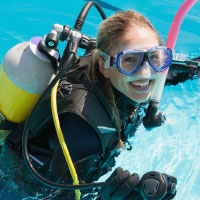
Full course: RMB 950 + AUD$85 (RMB430) for PADI ReActivate Touch
Pool refresher: RMB 800
Haven’t been diving lately and want a quick scuba refresher? The ReActivate™ program is the perfect way to update your dive skills and knowledge from the PADI Open Water Diver Course* before jumping back into the ocean. Whether you want a few reminders or need to go over the basics, ReActivate is personalized for you: You conveniently review scuba concepts on your tablet, mobile device or computer, then go diving with a PADI Professional. It’s quick and easy and a good way to prepare for your next PADI course or get ready for a diving vacation. Divers who complete both the knowledge and in-water skill refresher receive a replacement certification card with a ReActivated date on it.
Any PADI certified diver who wants a refresher or pre-travel update should ReActivate. Dive shops appreciate seeing a recent ReActivate date because it means you’re ready to explore.
What will you learn?
Using ReActivate Touch (for tablets or mobile devices) or ReActivate Online (for your personal computer), you’ll immerse yourself in dive scenarios and make decisions that test your understanding of important dive safety concepts, dive planning essentials and problem management. Move through ReActivate at your own pace and delve deeper into topics when you need or want to.
In the water, your PADI Professional will help you regain comfort and confidence in scuba diving. You’ll practice a few safety-related skills and then go over anything you specifically want to review.
What gear will you use?
You’ll use basic scuba gear including a mask, snorkel, fins, regulator, BCD and a scuba tank.
Course Schedule
-
Self Study
-
Confined Water Session (half day)
Course Options:
-
Full Course Package including Confined Water session & PADI Open Water Touch
-
Confined Water Session Only
The PADI Enriched Air Diver course is PADI’s most popular specialty scuba course. Why? Because scuba diving with enriched air nitrox gives you more no decompression time, especially on repetitive scuba dives. If staying down longer and getting back in the water sooner sounds appealing, then don’t hesitate to become an enriched air diver.
Who should take this course?
If you’re a PADI (Junior) Open Water Diver who is at least 12 years old, you can enroll in the Enriched Air Diver Specialty course.
What will you learn?
You’ll learn why diving with air that has higher oxygen and lower nitrogen content gives you more bottom time, along with enriched air equipment considerations. During a practical session, and two simulated (or actual) scuba dives, you’ll:
-
Discuss managing oxygen exposure.
-
Practice analyzing oxygen content in your scuba tank.
-
Set your dive computer for diving with enriched air nitrox.
How can you start learning now?
Read the Enriched Air Diver Manual and watch the Enriched Air Diving video. Stop by Kura Kura Divers to enroll in the course, get your materials and start learning.
What gear will you use?
Most modern scuba equipment and dive computers can be used with enriched air, but your PADI Instructor will let you know if your gear meets manufacturer recommendations and local requirements. However, scuba tanks must meet oxygen service standards and be dedicated for use with enriched air. You’ll practice using oxygen analyzers and special cylinder decals. Your PADI Instructor will explain other equipment you may need to enjoy enriched air diving.
Course Schedule
-
Self Study
-
Knowledge Development
-
Dive Simulations (or 2 open water dives)
Emergency First Response training focuses on building confidence in rescuers and increasing your willingness to respond when faced with a medical emergency. Course participants learn simple steps to follow for emergency care and practice applying skills in a stressful free learning environment. All courses are supported by self-study manuals and videos to enhance learning and allow you to start learning right away. This program is a non-diving course that only contains classroom training.
Who should take this course?
Anyone interested in learning emergency care may take these courses. No certification or age prerequisites.
What will you learn?
Primary Care (CPR) – This course teaches you the steps and techniques for handling life-threatening emergencies. You’ll practice eight skills for aiding patients who aren’t breathing, have no heartbeat, may have a spinal injury, may be in shock or who may have serious bleeding. You’ll learn to how to perform CPR and continue to monitor the patient, so that you provide every possible chance of survival while waiting for emergency medical services to arrive. Also included is how to use an AED (automated external defibrillator).
Secondary Care (First Aid) – Because many medical conditions are not life-threatening and emergency medical services are sometimes delayed or unavailable, this course teaches you how to provide first aid that eases pain and reduces the risk of further harm. You’ll learn to assess a variety of injuries and illnesses and practice bandaging and splinting.
Course Schedule
-
Self Study
-
Knowledge Development (half day)
-
Practical and realistic scenarios (half day)
-
1 day for knowledge development, practical and realistic scenarios.
Corporate and group rates available. We also offer comprehensive First Aid at Work courses, specifically designed to meet national and international compliance standards for CPR and first aid courses in the workplace.
If you a new Open Water Diver or have hundreds of dives, PADI Specialty courses allow you to broaden your diving skills and knowledge. If becoming a Master Scuba Diver is your goal, the path starts with earning a PADI Open Water Diver certification, followed by PADI Advanced Open Water Diver and PADI Rescue Diver (or qualifying certifications). You also need to earn five PADI Specialty Diver certifications and have logged a minimum of 50 dives.
Project Aware – Coral Reef Conservation
Everyone likes to scuba dive or snorkel in warm, clear water on a vibrant coral reef, yet many people know little about what they’re seeing or the importance of reef ecosystems. The AWARE – Coral Reef Conservation Specialty course helps you appreciate the complexity of these habitats and teaches you how you can help conserve these vital systems.
Anyone who has an interest in the aquatic world can take this course. There are no prerequisites or age restrictions and no water sessions are required to earn this non-diving certification.
What will you learn?
Through classroom discussions, you learn:
-
How coral reefs function and the complex nature of life on a reef.
-
Why coral reefs are so important.
-
Why many coral reefs are in serious trouble.
-
What you can do to prevent further decline.
-
How Project AWARE unites divers and water enthusiasts to make a difference.
Project Aware Specialist
Project AWARE’s philosophy is to mobilize a global force of scuba divers and water enthusiasts who care about protecting the world’s water resources and choose to make a difference – one dive at a time. By earning the Project AWARE Specialist certification, you’ll be aware of the most pressing problems facing vulnerable aquatic environments and know what everyday actions you can take to help protect them.
Anyone who has an interest in the aquatic world should take this course. There are no prerequisites, age restrictions or water sessions required for this non-diving specialty.
What will you learn?
Through classroom discussions, you learn:
-
How Project AWARE unites scuba divers and water enthusiasts to make a difference.
-
About environmental issues in the ocean commons and coastal zones.
-
About fisheries challenges and sustainability problems.
-
What’s happening to coral reefs and reef inhabitants.
-
Your role in protecting aquatic environments.
Emergency Oxygen Provider
Knowing how and when to use emergency oxygen is a great skill to have and means you’re ready to help others should the need arise. Becoming a PADI Emergency Oxygen Provider lets you breathe easy knowing that you can recognize scuba diving illnesses treatable with emergency oxygen, and are prepared to offer aid.
There are no prerequisites, age restrictions or water sessions required for this course – it’s open to everyone. Scuba divers, snorkelers and anyone who is around divers – boat crew, lifeguards, etc. – will benefit from having this training.
What will you learn?
You’ll learn about dive injuries, different types of emergency oxygen equipment and safety considerations when using oxygen. Then you’ll practice:
-
Assembling and disassembling emergency oxygen equipment.
-
Deploying a non-rebreather mask and a demand inhalator valve on a breathing diver.
-
Using a pocket mask on a nonbreathing diver.



